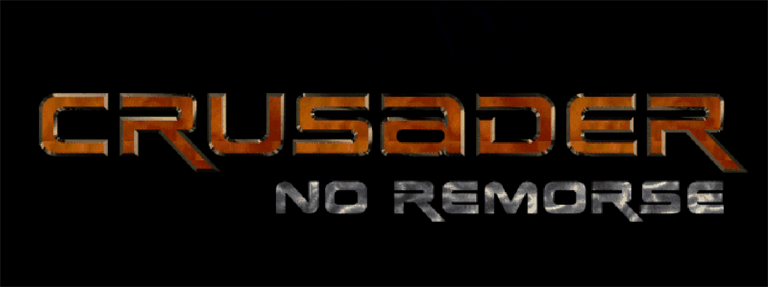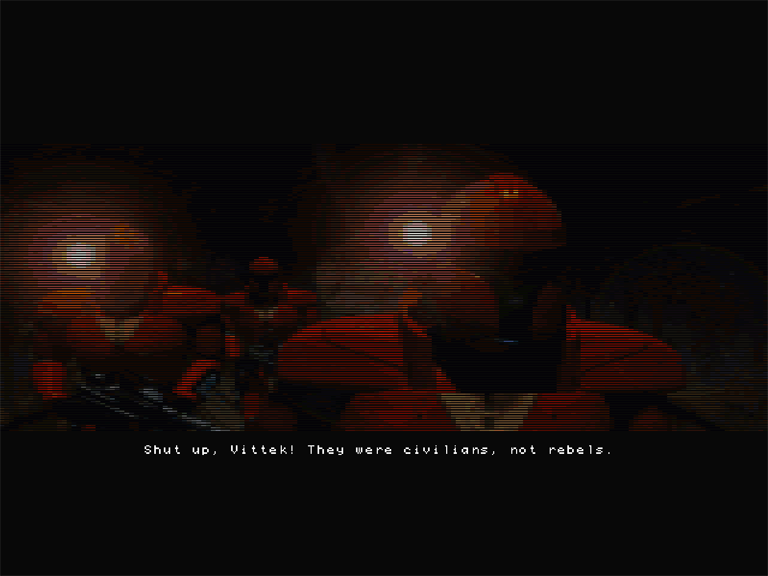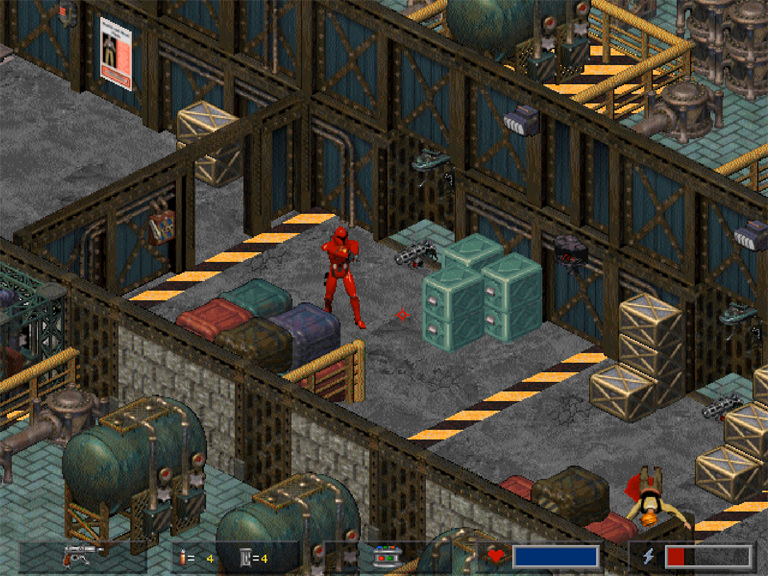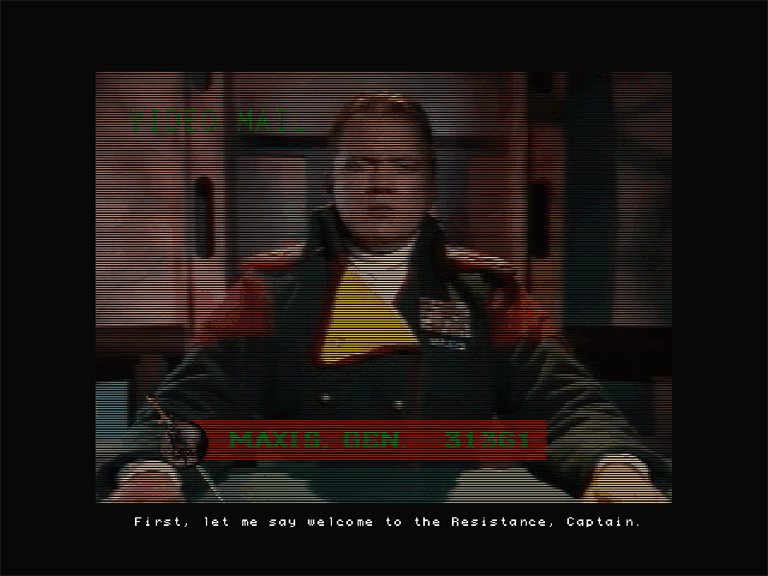Nowadays – surrounded as we are by game worlds with backstories crafted by award-winning writers, graphics made by professional artists and programming architecture using the latest physics and sound plug-ins – it is easy to take such gaming excess for granted. Games are an art-form because of course they are: give me 212 million USD (Horizon: Forbidden West's production budget) and even if I, personally, can't make an award-winning game with the money, chances are good I could hire people who could... There are entire industries providing game developers with the latest, easily integrated tools to make stunning special effects, "so real it feels you're there" sound or lifelike animation.
In short, the fact that computer games are as accomplished as they are is more akin to a Foregone Conclusion than a Pleasant Surprise.
Roll back the clock a few decades, though, to the heady days of 1995, and computer games with immersive, fully realized worlds were still an Intriguing Notion only a few studios were willing to try on and the divide between Games As Art and Games As Just Games was still very much in place. The studio most willing to lean into the Artform angle was Origin Systems and one of the games they did it with was Crusader: No Remorse.

The way they accomplished it was straightforward enough (partly, quite literally) on paper, but in practice required a lot of in-house, original work to produce a brand new, comprehensive game world that shipped with a cozy, lived-in feel.
To get the baseline descriptors outta the way, Crusader was an isometric shooter with a fixed perspective running on an improved version of Ultima VII's graphics engine with full SVGA (that's 800x600 in True Color, for those of you who don't remember or have to look it up). The game had its own, custom sound engine (called the Asylum Sound System), Full-Motion Video sequences with live actors (none of whom you've heard of) and a vengeance plot for the ages that remains relevant and eminently playable to this day (which, for a 28 year old game, ain't nothing).

In Crusader, you played the anonymous Captain – an elite Silencer of the World Economic Consortium, whom his employers tried to kill for refusing to fire on civilians and who, subsequently, switched sides and joined the anti-WEC resistance.
While the game is action-centric, it was planted firmly on the side of realism. Trading fire was brief and to the point. Plain-clothed civilians and security guards died after a single bullet, while robots and folks as armored as yourself could take a few more hits. You could carry five weapons (which, okay, was probably three more than your average soldier could lug and four more than he'd need); and though, in later stages, they were purely science fiction-y (lasers, plasma guns), for the most part they were fairly mundane (pistols, shotguns, assault rifles, grenade launcher).
Ballistic weapons had to be reloaded on empty and depleted your ammo reserves, while energy weapons (and, later, shields) ran on batteries you had to purchase or find.
The game required you to be mindful of cover as – especially against heavily armed opponents – standing out in the open was a quick way to ruin the polish on that gleaming red armor. Another thing to watch out for were environmental hazards: standing on damaged catwalk grating could drop you into a vat of Green Goo (TM), barrels could explode and that innocuous outlet in a pipe was one valve twist away from spouting flames.
Veteran soldier that he was, the Captain could crouch, walk, run, sprint and jump and had a combat roll, which came handy for around-the-corner ambushes or quickly getting out of the way of incoming fire.

Action aside, though (which, for an action game, might seem like a misnomer) the best aspects of Crusader were Atmosphere and Exploration.
The Atmosphere started right when you opened the box (yes: in olden times, games came on CDs packaged in colorful boxes), with printed material straight out of the game world: a WEC Site Security brochure printed on bright white letter stock, a resistance newsletter on spotty, recycled paper and a Silencer recruitment poster all served to dunk you straight into the backstory before you even booted up the game. It was a strategy Origin Systems tried before (in the Wing Commander series or Bioforge), but never so extensively or successfully; and one Ion Storm would emulate a few years down the road with its magnificent Deus Ex.
I'm usually not a fan of FMVs in non-FMV games, but here they worked beautifully. The entire cast did the writing justice, portraying characters with believable outlooks and convictions, who started out not trusting you worth a damn before gradually, grudgingly, coming around to seeing you as an asset (if not exactly "one of their own").

Crusader's writing was solid, if a bit grim, with a straight-shooter's tendency to not sugar-coat bad developments or rose-tint tragedy. It took itself seriously enough to be believable, but never went over the top — straddling a nice middle ground between realism and fiction. For a story involving a mute PC and cast you only got to "interact" with through one-sided FMVs, it packed a bigger emotional punch than most more modern "classics" I could name.
As for the Exploration aspect, I've always been of a mind that Core Competency Is Not Enough and it seems like the good folks at Origin Systems and Loose Cannon Productions agreed with me. Far from being a straightforward shooter, Crusader involved quite a few little sidelines along the way.
To wit, not only could your objectives for a given level suddenly change (as they are wont to do in high-pressure situations), but the route from start to finish was also liberally furnished with computer messages you could read, locked doors or safes you could find the combinations to, secret areas with extra weapons or equipment to discover and easter eggs a-plenty from System Shock, Bioforge and the Wing Commander series.
And while the levels started out big and eventually turned sprawling, the level design was so good, you could always, eventually, discover the way forward without the ubiquitous, obvious "nav point" modern games so fondly spoon-feed their audiences, as if they were too dumb to figure things out for themselves.
Overall, while Crusader: No Remorse offered a limited range of gameplay, the things it did offer were a believable dystopian future setting (which, to be honest, ain't that far off from our own tense present); tight, realistic combat punctuated by oodles of exploration and a story you wanted to be a part of – if only to see things set right.
If you have a hankering for some great action, a beautifully crafted game world, a righteous story line or simply Experiencing a Timeless Classic, I highly recommend Crusader: No Remorse. Nearly three decades on, the appeal of the silent hero in red is still hard to resist.
Pig (Does Not) Recommend:
- -although it may seem tempting to give its quasi-sequel, semi-expansion – Crusader: No Regret – a go, do keep in mind that it's simply riding the coattails of its more accomplished progenitor; where No Remorse was an experience, No Regret is, regrettably, Just A Game; it may use the same assets and "continue" the same story, but it's more pew-pew than (he)art;
